09 Aug2019
By Conra Gist
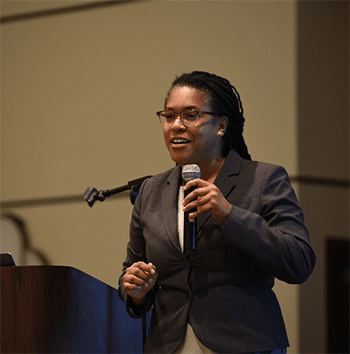
At the 2019 AACTE Annual Meeting, the third annual Diversified Teaching Workforce (DTW) Institute convened teacher educators, aspiring teachers, school leaders, and deans from across the nation to address one of the most pressing teacher education issues—diversifying the teacher workforce. Leaders of the DTW Topical Action Group (TAG), with the support of AACTE’s Member Engagement and Support team, organized the Institute. The event began with a welcome by AACTE President and CEO Lynn M. Gangone and a presentation by AACTE consultant Jane West on the state of teacher diversity in educator preparation. Marvin Lynn, College of Education dean at Portland State University, followed with opening remarks that contextualized the critical challenges facing the educator workforce as it relates toteacher diversity.
The morning plenary featured a panel facilitated by Delisa Saunders and Dyan Smiley of the American Federation of Teachers that examined
05 Aug2019
By Jane E. West

This blog post is written by AACTE consultant Jane West and is intended to provide update information. The views expressed in this post do not necessarily reflect the views of AACTE.
The Senate left town yesterday following on the heels of the House bringing the five-week summer recess into full bloom. Congress will reconvene in September, and thanks to the passage of the budget deal, move forward in adopting 12 appropriations bills, including one with education spending. However, obstacles remain.
26 Jul2019
By Katrina Norfleet
The Teacher Educator national peer-reviewed journal recently shared the top 10 most downloaded articles in the first three months of 2019. The most downloaded article in 2018 was “Current Issues in Teacher Education: An Interview with Dr. Linda Darling-Hammond” with 2,726 downloads. Other popular articles cover a range of topics including multicultural teacher education, perceptions of ELL students, student stress and coping, and teaching reflective practice. The full list of the top 10 articles are included in the table below.
AACTE President and CEO Lynn M. Gangone serves on Editorial Advisory Board of The Teacher Educator, a forum for promoting discussion among educators who seek to challenge existing boundaries in the field. The journal invites AACTE members to submit notable work on current
19 Jul2019
By Brian McNeill
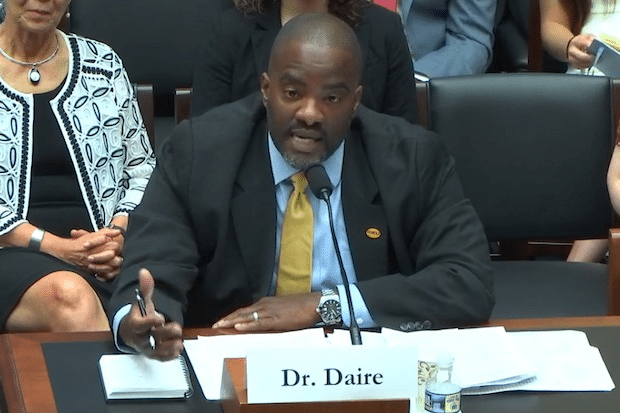
This article and photo originally appeared in VCU News and are reprinted with permission
Andrew Daire, dean of the School of Education at Virginia Commonwealth University, testified at the U.S. House Wednesday about how VCU is working to prepare high-quality, dedicated classroom teachers and encouraged Congress to support similar initiatives across the country.
“Immediate and innovative action is required to address the challenges in high-needs and low-performing schools with families living in generational poverty and disparities in student learning outcomes,” said Daire, testifying before a joint U.S. House Education and Labor Committee subcommittee hearing on “Educating our Educators: How Federal Policy Can Better Support Teachers and School Leaders.”
“The challenges faced by many of our schoolchildren, and in many of our schools, are not average and will not be met with average efforts,” Daire said in his prepared testimony. “We need to be bold and aspirational in our desires and efforts to address these challenges.”
19 Jul2019
By Michael Rouleau
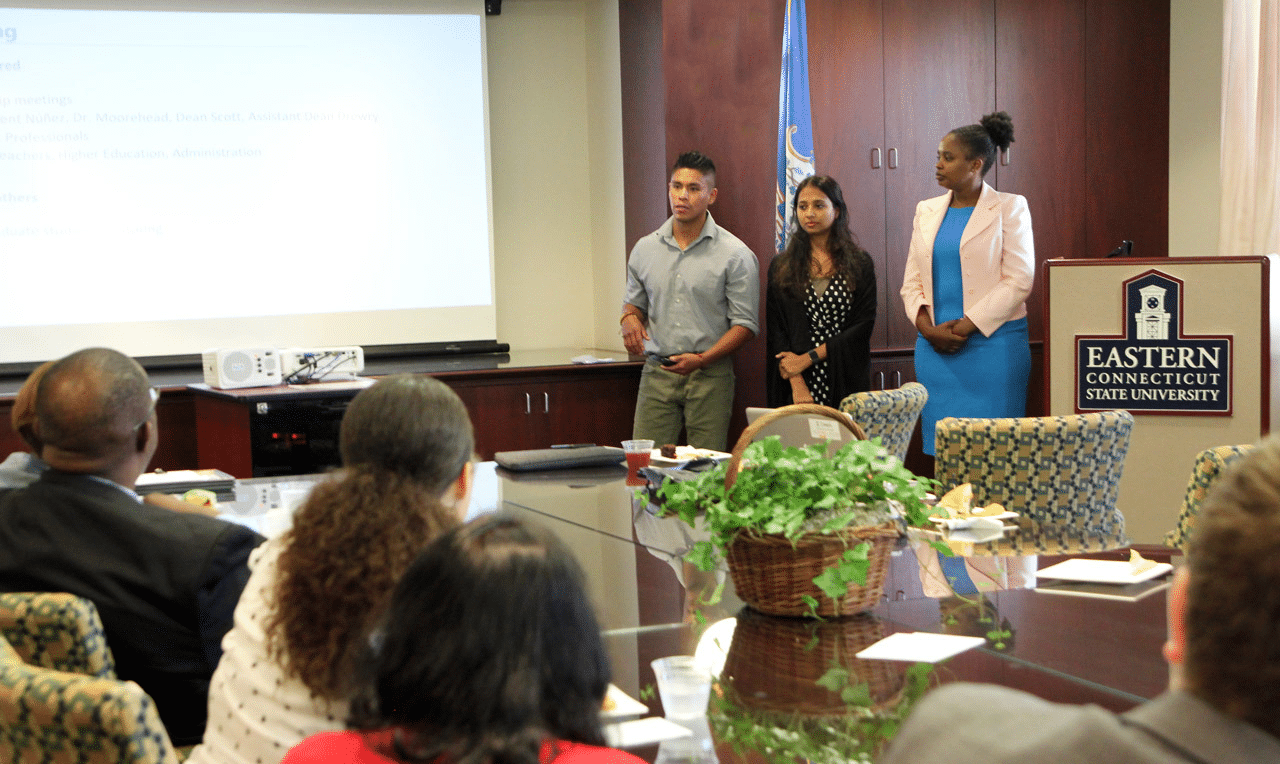
This article and photo originally appeared on the Eastern Connecticut State University website and are reprinted with permission.
School districts across the nation continue to face a lack of minority teachers. Eastern Connecticut State University’s participation in the Holmes Master’s Program seeks to alleviate this problem. On June 28, Eastern celebrated three aspiring teachers from underrepresented backgrounds who will soon enter the teaching profession. Faith Kioko (Ashford), Ian Stygar (Lebanon) and Sayantani Nandy (Ellington) were honored at the annual Holmes Master’s Luncheon, hosted by the School of Education & Professional Studies and Graduate Division.
The American Association of Colleges for Teacher Education’s (AACTE) Holmes Program supports students from historically underrepresented groups who are pursuing careers in education. Eastern continued its partnership with Holmes, hosting its third cohort of Master’s students this year.
The 2019 cohort of full-time graduate students had a busy year in pursuit of teacher certification. In addition, they designed research proposals, worked in Eastern’s Center for Early Childhood Education, presented to classes and hosted forums on campus. They interviewed alumni teachers and gathered data for the Council for the Accreditation of Educator Preparation (CAEP). They also attended the AACTE’s annual Washington Week and advocated on
17 Jul2019
By Jerrica Thurman and Donna Sacco
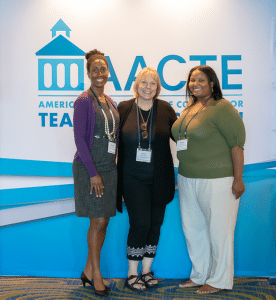 AACTE’s Jerrica Thurman first met Donna Sacco in 2015. Sacco was one of three doctoral students from George Mason University (GMU) who worked as an AACTE education intern, assisting in advocating for high-quality preparation programs and with its marketing communications. Thurman was pleasantly surprised when she saw Sacco at AACTE’s 2019 Washington Week with her two Holmes doctoral students from the University of North Carolina at Charlotte (UNCC). It was during her AACTE internship that Sacco learned about the Holmes Program and determined to make a personal contribution to help diversify the teacher workforce by becoming a Holmes advocate. The following summary highlights an interview Thurman had with Sacco about her journey from an intern to a change agent in education.
AACTE’s Jerrica Thurman first met Donna Sacco in 2015. Sacco was one of three doctoral students from George Mason University (GMU) who worked as an AACTE education intern, assisting in advocating for high-quality preparation programs and with its marketing communications. Thurman was pleasantly surprised when she saw Sacco at AACTE’s 2019 Washington Week with her two Holmes doctoral students from the University of North Carolina at Charlotte (UNCC). It was during her AACTE internship that Sacco learned about the Holmes Program and determined to make a personal contribution to help diversify the teacher workforce by becoming a Holmes advocate. The following summary highlights an interview Thurman had with Sacco about her journey from an intern to a change agent in education.
What piqued your interest in the issues of teacher diversity as a doctoral student at George Mason University and student intern at AACTE?
Before my doctoral program, I was a special educator with a master’s degree in bilingual special education. For my entire career, my focus has been on culturally and linguistically responsive instructional practices. Part of my drive came from the stories my father told me about the obstacles he experienced in his childhood as the son of Italian immigrants. He was a brilliant man but never went to college. He had one advocate who helped mentor him in appreciating the arts but had no teachers who were advocates, role models, or who understood his background. Once I began researching teacher education, I was surprised to learn that the teaching force is composed of roughly 80% white female teachers. How had I missed that obvious point? I am a white female who was teaching mostly boys of
15 Jul2019
By Jane E. West

Congress came back to Washington this week with a boatload of work to do in the short few weeks before the next recess, in August. It could be a long hot summer.
First up: Budget and Funding
When Congress left for July 4 recess, the House had passed almost all of the 12 required funding bills and the Senate had not begun with any of the 12 bills. September 30 marks the end of the fiscal year; without the new spending bills signed into law, a government shutdown will be in the offing. With Congress scheduled to be in recess most of August, the pressure is on.
The holdup is the budget—or the overall spending cap, which the House, the Senate, and the White House must agree to pass. While the House adopted its own budget caps, they are higher than those that the Senate or the White House will accept. Added to the mix is the pending need to raise the debt ceiling (this is the borrowing limit for the federal government, which routinely needs to be raised to avoid default). Thus, the pressure is on from three corners: budget, FY 2020 funding bills, and debt ceiling. These three dire needs are in the mix together and there is an effort to wrap their resolution into one package—possibly before the August recess. Learn more.
Senate Confirms New Higher Education Leader for Department of Education
11 Jul2019
By Jerrica Thurman
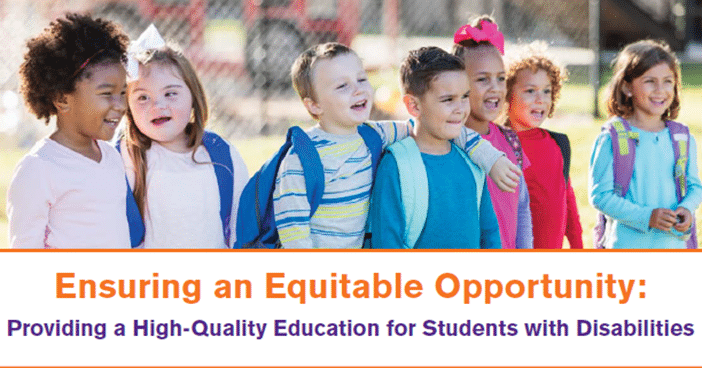
The Council of Chief State School Officers (CCSSO) recently released Ensuring an Equitable Opportunity: Providing a High-Quality Education for Students with Disabilities, a report that details policy and practice considerations around individualized education plans chiefs and state education leaders can reflect upon and implement in ensuring all students, especially students with disabilities, have access to a high-quality education. Students with disabilities are provided with an individualized education program (IEP) to ensure they receive specially-designed instruction and related services. The IEP is the primary mechanism for ensuring students with disabilities receive the right educational content and rigor at the right moment in their education.
The Education for All Handicapped Children Act of 1975 marked an historic win for civil rights when the doors to public education were opened for all students. For the first time, children with disabilities had access to a public education and the hope of a productive and fulfilling future. Today, the Individuals with Disabilities Education Act of 2004 (IDEA), the most recent iteration of that law, aims to deliver on that promise; namely, that all students with disabilities have equitable access to a free appropriate public education (FAPE) in the least restrictive environment.
01 Jul2019
By Katrina Norfleet
AACTE board member Donald Easton-Brooks is widely known as a scholar of educational policy and culturally responsive teaching. This year, he released his book Ethnic Matching: Academic Success of Students of Color. In a recent Q&A with AACTE President and CEO Lynn M. Gangone, Easton-Brooks talked about the book and how his research shows diversifying the teaching profession will ultimately improve student’s success. The following summary highlights the conversation.
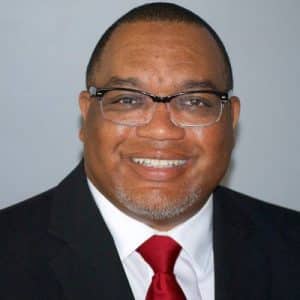 How would you describe the concept of ethnic matching and its importance to student learning?
How would you describe the concept of ethnic matching and its importance to student learning?
What ethnic matching initially suggests is that teachers of color can play a significant role in enhancing the academic experience of students of color. As this research and other research progress, findings have shown that teachers of color can play a significant role in also enhancing the academic experience of white students and can assist in enhancing a more culturally responsive profession as a whole. Therefore, the concept and research related to the concept suggest that we need to diversify teacher education. Mainly because as our communities are becoming more diverse, we are seeing our public schools also becoming more diverse. Yet what is happening is that our educator profession is not growing at a similar rate as these communities of students. The research around the concepts shows that perceived knowledge or knowledge from a preceptive culturally lens can play a role in students’ understanding of concepts, learning, and processing of information. This often can lead to these students being misinterpreted by teachers and feeling somehow misunderstood by teachers if they do not have that cultural lens to understand them. That is what teachers of color can bring to the table that can be of assistance to educational systems.
28 Jun2019
By Jerrica Thurman
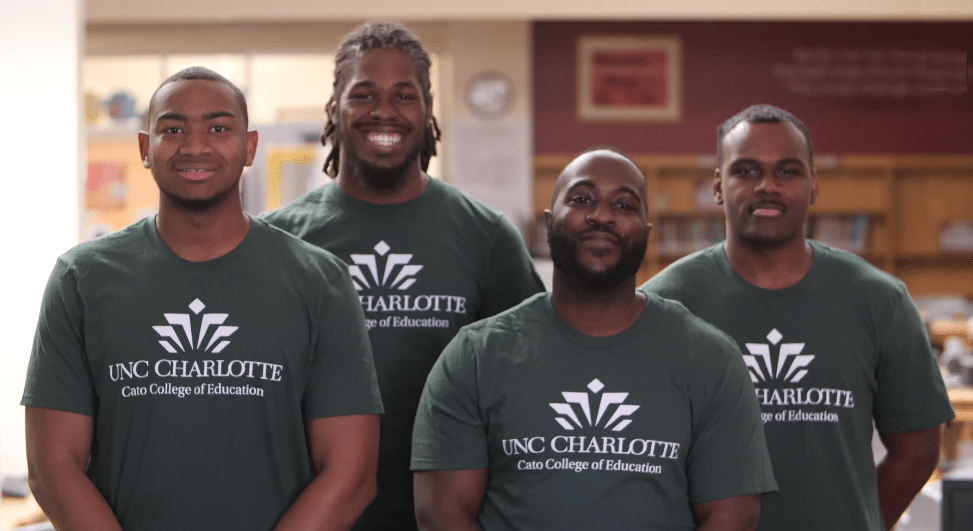
AACTE member institution Cato College of Education at the University of North Carolina at Charlotte (UNCC) works to create effective solutions to the shortage of Black male teachers. Thomas Fisher, supervisor of student teaching in the Office of School and Community Partnerships, recruited four of his former students to help implement a program to engage and recruit Black male students into the teaching profession. The team visits schools and shares their story to inspire a new generation of educators in the most underrepresented demographic in teaching.
“There’s only 2% Black male teachers in the United States,” says Timothy Wells, social studies teacher at Ridge Road Middle School, who is featured in the “What’s Your Impact?” video. “Studies show that your success increases if you have a Black male teacher or a male teacher in general from an early age.” The video spotlights Black male graduates of UNC’s Cato College of Education as they share why they pursued a teaching career. It also includes Edwin Campbell, American history teacher at Vance High School; Devin Murphy, math teacher at Myers Park High School; and Dwayne Simmons, English teacher and dean of students at Quail Hollow Middle School. Please take a few minutes to watch the video above to hear the dynamic stories of these educators.
25 Jun2019
By The Virgin Islands Consortium
This article and photo originally appeared in The Virgin Islands Consortium and is reprinted with permission.
The University of the Virgin Islands on Monday launched an Inclusive Childcare Laboratory and Diagnostic Center on the St. Thomas Campus. According a release the institution of higher learning issued, the new facility is intended to enhance the educational experience of preservice teachers who will be supervised by professors as part of their studies—while supporting the university’s students and employees to better manage the challenges of balancing parenthood and college life. UVI will be among the first Historically Black Colleges and Universities to provide this service.
The establishment of a research-based childcare program linked to early childhood and the School of Education has been a goal of UVI President David Hall’s since 2014. “This idea has evolved over the years and it’s no longer just a place to care for our students’ children, but an opportunity to create a model early education center that can help enhance the quality of early childhood education throughout the Virgin Islands,” Mr. Hall said. “The significance of this project is now more transformative than our students imagined.”
As many as 30 children can be admitted at the center at a time. The center is open for children between ages two to eleven. Initially, the center will be operational from 3 p.m. to 10 p.m. However, it is expected to evolve from an after school to full-day childcare center, according to the university.
The idea for the childcare center arose from a survey of UVI students, staff and faculty who emphasized the need for such a facility on campus. “The University’s ability to address this critical need indicates that we listen to our students and we strive to address their needs,” Mr. Hall said.
24 Jun2019
By Carla Roberson
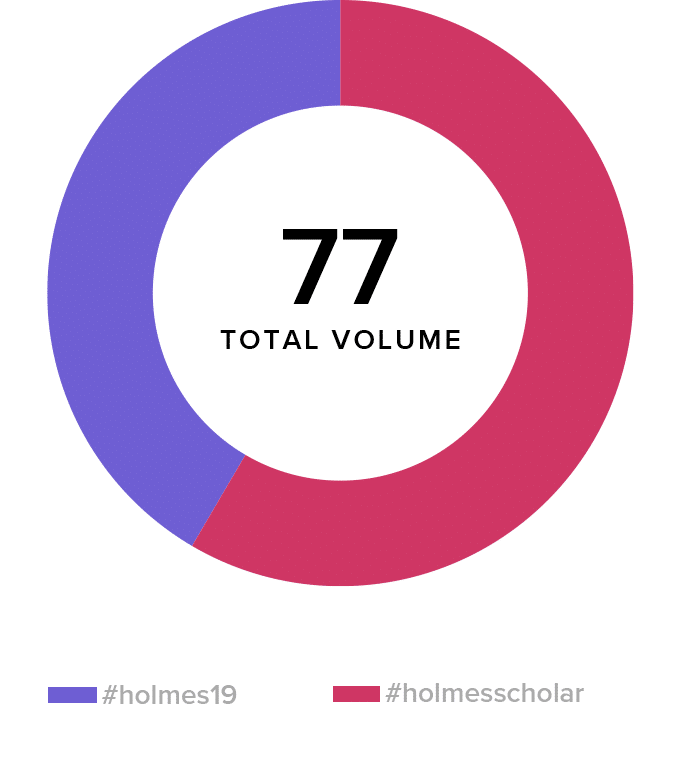
AACTE’s Holmes Scholars were busy on Twitter advocating for education policy issues using their hashtags #HolmesScholar and #Holmes19 during Washington Week this month. The students learned how to elevate their voices and research to positively impact future policies for students of color and other marginalized groups during the Holmes Summer Policy Institute, June 3. They wasted little time in implementing these best practices throughout the week’s events particularly during their participation in AACTE’s Day on the Hill. From Facebook Live interviews to Twitter posts, the Holmes Scholars made their voices heard on why it is important for education students to play an active role in advocating for the teaching profession.
The Holmes Scholars have also turned to social media to grow their community and to stay connected year round. You can follow the AACTE Holmes Program on Facebook, on Instagram at @aacteholmesscholars, and on Twitter at @HolmesScholars, and follow the hashtags: #OnceAScholarAlwaysAScholar, #HolmesScholar, and #Holmes19.
12 Jun2019
By Gretchen Wright
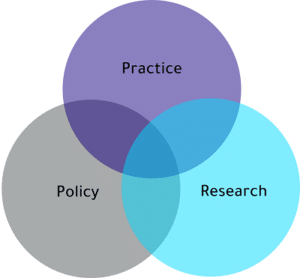 Research shows that teachers are the number one in-school factor affecting student outcomes and principals are the number two factor. One important metric for those outcomes is how well and how equitably our nation’s diverse students are able to navigate our increasingly global and technologically complex world, where skills like critical thinking, collaboration, communication, and being able to apply knowledge in a range of contexts are crucial to success. Today, Learning Policy Institute and Bank Street Graduate School of Education have announced the launch of the Educator Preparation Laboratory (EdPrepLab), a new initiative to help educator preparation programs ensure that new teachers and leaders are able to provide all k-12 students with the kind of deeper learning that helps them develop those skills.
Research shows that teachers are the number one in-school factor affecting student outcomes and principals are the number two factor. One important metric for those outcomes is how well and how equitably our nation’s diverse students are able to navigate our increasingly global and technologically complex world, where skills like critical thinking, collaboration, communication, and being able to apply knowledge in a range of contexts are crucial to success. Today, Learning Policy Institute and Bank Street Graduate School of Education have announced the launch of the Educator Preparation Laboratory (EdPrepLab), a new initiative to help educator preparation programs ensure that new teachers and leaders are able to provide all k-12 students with the kind of deeper learning that helps them develop those skills.
EdPrepLab brings together 15 of the nation’s leading teacher and principal preparation programs to collaborate on further developing and documenting models for preparation that equip educators to advance deeper learning and equity, and that can inform other programs across the nation. The initiative will also support research to improve preparation programs and work with policymakers at federal, state, and local levels to help leverage policies that encourage the use of research-based practices that ensure new teachers and school leaders are well-equipped to provide deeper learning and to build the next generation of equitable schools and instructional education practices.
“Our world has changed significantly since the U.S. education system was first developed, and students today need an education that supports and prepares them for that more diverse, technology-driven, knowledge-based society,” said Learning Policy Institute President Linda Darling-Hammond. “That means we need to prepare teachers and school leaders to provide this kind of education. Fortunately, we have research to guide the way. There is a wealth of new knowledge about the science of learning and development, how social and emotional skills support academic learning, and how to ensure that students really understand what they have learned.”
10 Jun2019
By University of Tennessee News

This article and photo originally appeared on the University of Tennessee News website and are reprinted with permission.
A new program aimed at increasing the number of licensed teachers from diverse backgrounds will launch this summer in the College of Education, Health, and Human Sciences.
The program, Increasing Teacher Equity to Address Community High Needs (I-TEACH), is funded by a Tennessee Higher Education Commission grant recently awarded to the college to support diversity in education and to fill critical teaching shortages across the state. The two-year program supports 12 eligible teacher candidates for 33 hours of coursework and clinical practice. Candidates who complete the program will graduate with a master’s degree in teacher education.
24 May2019
By Jerrica Thurman
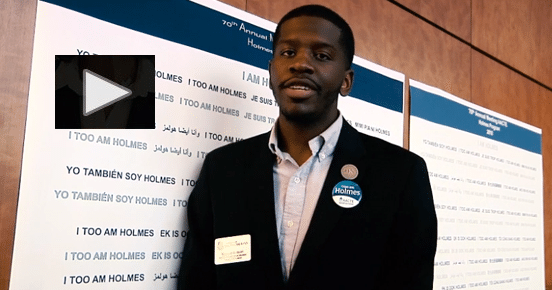
In this latest video entitled, “I am Holmes Too,” Holmes coordinators and students discuss the value of the AACTE Holmes Program, which focuses on recruiting educators of color into the teaching profession. They share how the program supports their work, research, and advocacy efforts in educator preparation.
Here’s what a few of the participants had to say:
“I would like to say thank you to Holmes for being a great support system throughout my academic journey.” – Jerraco Johnson, Auburn University
“One thing I appreciate about being part of Holmes is it provides the opportunity to learn and grow from others as well as provide me with research opportunities.” – Talisa Jackson, George Mason University

















 Research shows that teachers are the number one in-school factor affecting student outcomes and principals are the number two factor. One important metric for those outcomes is how well and how equitably our nation’s diverse students are able to navigate our increasingly global and technologically complex world, where skills like critical thinking, collaboration, communication, and being able to apply knowledge in a range of contexts are crucial to success. Today, Learning Policy Institute and Bank Street Graduate School of Education have announced the launch of the
Research shows that teachers are the number one in-school factor affecting student outcomes and principals are the number two factor. One important metric for those outcomes is how well and how equitably our nation’s diverse students are able to navigate our increasingly global and technologically complex world, where skills like critical thinking, collaboration, communication, and being able to apply knowledge in a range of contexts are crucial to success. Today, Learning Policy Institute and Bank Street Graduate School of Education have announced the launch of the 
